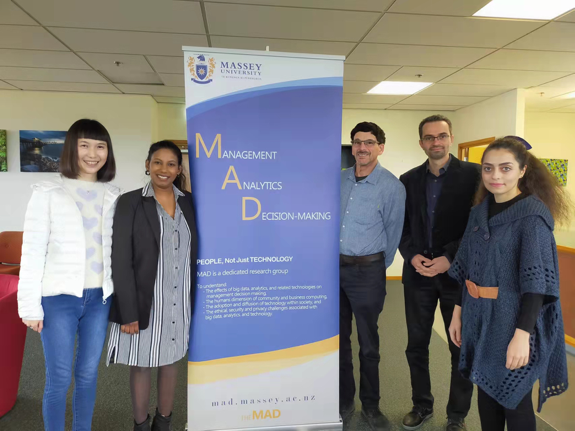MAD Project 2025 –
New Zealanders’ Perceptions of Emerging Technologies:
Governance, Ethics, Security and Risks
The Management, Analytics, and Decision Making (MAD) research group has been awarded by the Multi Agency Research Network (MARN) and Massey University. The project will seek to foster nation-wide understanding of the risks and opportunities associated with emerging technologies in Aotearoa New Zealand. Emerging technologies, such as IoT, AI, robotics, facial recognition, have overwhelming implications for society as a whole.
The first stage of the project was conducted in 2022. In the stage, a multi-faceted survey questionnaire was developed. The survey instrument enabled capturing of Kiwis’ perceptions of emerging technologies and the risks and concerns associated with them. The second stage of the project will be completed by the end of 2023. It will develop a theoretical model, a methodologically rigorous survey instrument, and collect data to validate the instrument. It is expected that the results will have wide-ranging potential to shape government policy for better technology development, implementation and governance in New Zealand by providing critically important social context.
MARN
The MARN was created in 2016 to facilitate the exchange of knowledge between security-related agencies and Massey researchers, including developing relationships with research directors from each College, as well as prioritise areas for research. This includes a research seed fund for small exploratory projects to generate new research in priority areas. Dr Germana Nicklin, Senior Lecturer, Centre for Defence and Security Studies, School of People, Environment and Planning, College of Humanities and Social Sciences, Massey University is the Convenor of MARN.
MAD
The MAD research group currently consists of four Albany staff members - Professor David Pauleen, Dr. Hamed Jafarzadeh, Dr. Kasuni Weerasinghe, and Dr. Shafiq Alam, two PhD students, and twenty former PhD students and international colleagues. Additional information on MAD can be found at mad.massey.ac.nz.
If you would like more information on this project please contact MAD at mad@massey.ac.nz.
Why this study is need
At the start of the 21st century, technology has become embedded into every aspect of individual and social life. Emerging technologies, such as AI, facial recognition, big data, genetic engineering, IoT, and robotics, along with related governance issues present serious risks as noted in a relatively recent research report on global challenges by a multidisciplinary worldwide group of scientists (Pamlin & Armstrong, 2015)*. Notable scientists and technologists such as Stephen Hawking, Elon Musk, and Bill Gates caution that robots and Artificial Intelligence could wipe out humanity, and have called for safeguards on AI. Consistent with their concerns, the report asserts that “it is important to understand that much of the knowledge and many tools that we have, and will develop, can be both a risk and a solution to risks depending on context” (Pamlin & Armstrong, 2015, p. 10)*.
Emerging technologies which will greatly affect society are being developed and implemented at an increasing pace, often outstripping government attempts to regulate and the public’s ability to understand them. Implementing technological change without due consideration of stakeholders’ (e.g., citizens, technologists, business, government) perceptions may lead to a host of issues upon the introduction of such technologies into wider use. These may include social, governance, and technology-based issues, including public resistance, as well as technological design and use that does not meet stakeholder expectations. Governance and ethical issues involving inclusion/exclusion, data privacy, and security may also be involved.
GET INVOLVED
We consider this to be an ‘open source’ project.
If you have expertise or area knowledge that you would like to share, please contact us at mad@massey.ac.nz.
If you would like to participate in piloting the survey, please contact us at mad@massey.ac.nz.
Please bookmark this webpage and check back as we will be periodically updating details of the study.
MAD Team

* Pamlin, D. & Armstrong, S. (2015). Global challenges: 12 risks that threaten human civilization. Stockholm, Sweden:Global Challenges Foundation.